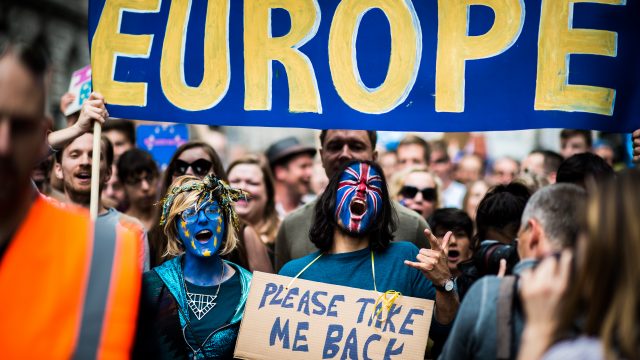Today marks a year since the British public voted to leave the European Union. It was an unexpected result which could have a massive effect on our rights – but what have we learnt in the last 365 days?
Leaving the European Union is one of the biggest jobs any British politician has had to oversee in decades. With thousands of our laws coming from EU legislation someone (or more likely multiple someones) is going to have to work out exactly how to get everything in order. These laws cover everything from employment rights to maternity pay, so exactly how we leave and the deal will get will inevitably have an impact on our human rights.
It’s been a year since we decided to opt out, and Prime Minister Theresa May officially started the process on March 29 2017, by triggering Article 50. This means we’ve got two years to negotiate how we leave the block. This aside though, progress has been decidedly slow, with Mrs May calling a snap election and losing her commons majority. Just today President of the EU Commission Jean-Claude Junker said he didn’t know what the UK wanted out of Brexit talks despite talks having officially begun.
Henry VIII Popped Up Again
https://www.facebook.com/RightsInfo/videos/1923012101264229/
That’s not to say we don’t know anything about what lies ahead though, with a certain long-dead monarch popping back up for one. With Britain only having two years before everything is supposed to be done and dusted, the Government is expected to make use of some long forgotten laws created by the Henry VIII.
The previous White Paper on Brexit said the UK would aim to preserve all EU laws as they were at the moment before exit, with Parliament then making a decision on whether to keep, repeal or amend specific laws after we leave. To move all the legislation swiftly into British law and make later amendments, a Henry VIII clause could be the answer – it allows the Government to repeal or amend it after it’s become an Act of Parliament – crucially without any further parliamentary scrutiny.
However, these plans have come under fire. The Government claim it’s all about timing, with one source saying claiming the task would otherwise take “forever”. Other parties disagree, saying the lack of accountability and scrutiny from wider Parliament is a massive power grab. Either way, these laws include some of our vital rights, so how they’re transferred is a key point in the divorce process.
Freedom of Movement & EU Workers’ Rights
 Brexit Protest Picture: Garon S / Flickr
Brexit Protest Picture: Garon S / Flickr
Freedom of movement and the rights of EU Workers’ to live and work in the UK have been top of the agenda ever since the vote to leave. More than a million British people live in other EU countries, most of them in Spain, as well as several million EU nationals living and working in the UK.
At the moment, free movement is a legal right of all UK citizens as part of being EU members. This means we can travel, live and work in any EU country, without the need for a visa or any special permission. Brexit, however, means all this has been thrown into uncertainty. An agreement will now have to be reached as to whether British people can still live, travel and work across Europe – and whether the millions of Europeans living in the UK will have a right to remain.
Theresa May had previously refused to guarantee the right to remain for EU citizens, but in the wake of the election offered to guarantee rights for those who had lived in the country for five years by a yet to be agreed ‘cut off date’. People who have yet to make five year will be allowed the time to stay, but won’t be able to apply for UK settled status until they reach the benchmark.
While the offer has yet to be formally agreed, it will offer a hint of stability to the millions of Brits and EU nationals living abroad – though there’s no word yet on freedom of movement in the future.
A New Bill of Rights is On Hold
 Image Credit: Liz Truss via Mr Gareth M / Flickr.
Image Credit: Liz Truss via Mr Gareth M / Flickr.
One of the Conservative’s Manifesto pledges in 2015 was to scrap the Human Rights Act and instead replace it with a new Bill of Rights. This has been taken off the pledge card in 2017, with then Justice Secretary Liz Truss confirming any plans for this are on hold until Brexit negotiations are over. This was also echoed in the official manifesto.
While the plans are now on-hold until at least mid-2019, this hasn’t shelved them altogether, with the document hinting there could be a re-think of our human rights laws after Brexit concludes. Currently the Human Rights Act brings the Human Rights Convention into UK law and gives us base protections against discrimination and safeguards our liberty, freedom of speech and even life itself.
There have been fears a new Bill of Rights could essentially be a watered down version of this, with several Tory MP calling on Theresa May to keep things as they are. It’s clear this now won’t be an issue for a couple of years though – but it could rear it’s head later along the line.
All in all, the Brexit negotiations are a tricky process, and there’s not a lot we’ve learnt so far. However, with the snap election out of the way and talks officially taking place, it’s likely we’re going to be seeing more news soon. Any developments are likely to have a big impact on our rights, so now more then ever, we need to take the time to inform ourselves about our human rights and how these changes will affect us.
Want to see more pieces on Brexit and human rights?
- Read our explainer on what the vote could mean for our rights
- Take a look at our video on Henry VIII clauses
- Understand what our human rights are – and what they do







